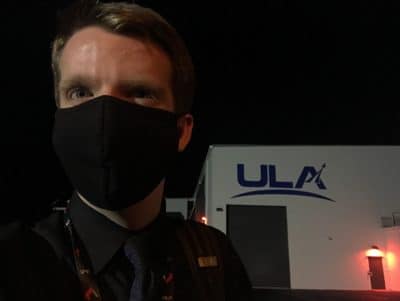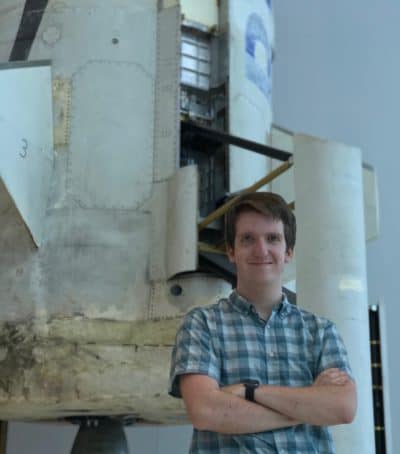Co-op/Intern Spotlight: Noah Soderquist

Noah Soderquist is pursuing a Bachelor of Science in Aerospace Engineering with a focus on Astronautics from Embry-Riddle Aeronautical University’s Daytona Beach campus. Born and raised in New Hampshire, he developed a keen interest in space exploration from the works of scientific contemporaries such as Carl Sagan and Neil DeGrasse Tyson. Growing up in an environment with few academic and extracurricular STEM opportunities and now pursuing an engineering degree, Noah is constantly learning in every aspect of his studies and work within the field of aerospace.
During the year of 2020, I had the privilege to work at Safran Test Cells, United Launch Alliance and Blue Origin in the Spring, Summer and Fall respectively.
How did you obtain your internships with Safran Test Cells, United Launch Alliance and Blue Origin?
My three internship opportunities came about in a couple of interesting ways. Firstly, both internships at ULA and Blue Origin were acquired in fairly similar manners with a formal online application through each company’s application portal. Proceeding the written application was the interview process. Both came in the form of hour-long phone interviews with questions varying in technical and behavioral nature. There were no follow-up interviews and offers were received by email from ULA and by phone from Blue Origin.
The Safran Test Cells opportunity was the outlier and came about in a very unique and roundabout way. My interest was piqued after discovering them in-person at the Fall 2019 Industry/Career Expo and I approached them to inquire about opportunities. They expressed interest after I informed them of some relevant experience and provided my resume and they informed me they would like to set up a phone interview, providing a set date and time. On the day, no call came and, still having the brochure took from their booth, I dialed the business number that was listed on it. After a short interaction with an employee from HR, the issue was remedied and the interview was rescheduled. This one happened as expected and a short while later, a phone call came with an offer.
What were the main takeaways from all three? How were your internships similar and different?
The main takeaway from all three internships was a well-taught lesson of adaptability. While each internship offered its own unique tasks and work environment, the one aspect which persisted throughout all three was the importance of analyzing the circumstances, taking in all pertinent information and acting upon it with some degree of haste given the short allotted time in the internship. In the case of a couple internships, this adaptability took the form being presented with and acting upon new responsibilities which had never been encountered before in any setting, professional or otherwise. In another, the adaptability was entirely related to factors beyond the scope of the assigned work and outside of anyone’s control and, in managing those instances, additional skills beyond those purely suited for a professional setting were acquired.
Discuss one challenge from any of your internship experiences and how you overcame it.
In two separate internships, by far the biggest challenge was being given projects relying heavily on software outside of the area of my expertise. Taking full advantages of skills acquired from university courses and company resources, these duties were quickly picked up and the designated tasks were completed as intended. This was a major exercise in adaptability as, prior to these two experiences, I had no experience in either software but was able to use some commonality with other programs I had used in the past to pick up a few core functions and work from there to expand my skillset to the capacity that was required.
You have experience with working hybrid (on-site and virtually) due to COVID-19, what are the strengths and drawbacks of hybrid work?
Some strengths of hybrid work (mostly from home but occasional in-office) include:
- Safe un-restricted environment with little to no worry of exposure.
- More relaxing lifestyle with smoother transitioning to and from a working environment.
- More refined and malleable work schedule with hours flexible depending upon department recommendations.
- Little to no transportation and office expenses.
- Better control over working environment ergonomics, hardware, utilities, etc., with a home office.
- IM-based communication and employee availability status allows for more efficient discourse.
Some drawbacks include:
- More fragile infrastructure (VPNs, company-provided computers/other hardware, etc) to facilitate working from home.
- More difficult to conduct networking.
- Day to day experience can be less exciting due to limited on-site work and lack of social interaction with coworkers.
- Significant decrease in the “sights and sounds” of a traditional internship experience.
What is your career goal(s)?
Put simply, my primary goal for my career going forward is to work in launch operations either in Florida or elsewhere for companies responsible for providing consistent access to space. In my mind there is nothing more exciting than working on the end items of a rocket production process, maintaining and operating the facilities required to put large quantities of hardware into space and working on the cutting edge of spaceflight infrastructure.
 What insights do you have for students to make themselves stand out on internship applications and interviews?
What insights do you have for students to make themselves stand out on internship applications and interviews?
I have two pieces of advice for those looking to pursue internships. Plenty of resources within Career Services provide excellent assistance in preparing for the presentation of information in resumes, applications and interviews however I believe there are two aspects entirely apart from technical knowledge and organized communication of information which truly create a memorable candidate in the eyes of a recruiter.
My first piece of advice is to display perseverance whenever possible. It is worth noting that this is very situation-dependent but if the opportunity exists, it can drastically increase the chances of leaving a memorable impression on the recruiter or company as a whole. Having only experienced such an opening once before when acquiring an interview with Safran Test Cells, I’m unable to provide much in the way of specific examples other than that it could take the form of additional communication created by the applicant through an appropriate channel such as email or phone if one or the other is provided. In the majority of cases, this action is most likely best left untouched since it can give the recruiter the wrong idea about the personality and intentions of the applicant. However, in certain circumstances, doubling back with the company or institution that is being applied to can leave a lasting favorable impression of the candidate, making the possibility for being selected for the next phase of recruiting more likely.
Secondly, and in my opinion most critically, is the importance of facing challenges. With the full range of diverse applicants that companies and institutions receive, by far the aspect which is most likely to stand out is whether the applicant has been faced with challenges in the past and if and how they overcame them. Universities across the country and the world have a wide variety of offerings in terms of research and extracurricular opportunities so finding one which the recruiter will perceive as being greater than any other is fairly slim unless in a highly specified discipline that the job description matches. Therefore my advice is, rather than seeking out a specific opportunity which, alone, gains the interest of the recruiter and expecting to get by on that, to find any opportunity of high interest to the student and seek out any and all challenges associated with it. Sheerly through the process of overcoming challenges and displaying a significant amount of resilience, a much stronger case can be made for that individual’s potential for new challenges in a new workplace environment with new tasks to overcome. A high reliability for overcoming challenges over other candidates may be just what a recruiter needs when looking for someone who can handle a new set of responsibilities they would not have encountered before.
Article originally featured in Career Services Co-Op/Intern Spotlight Series